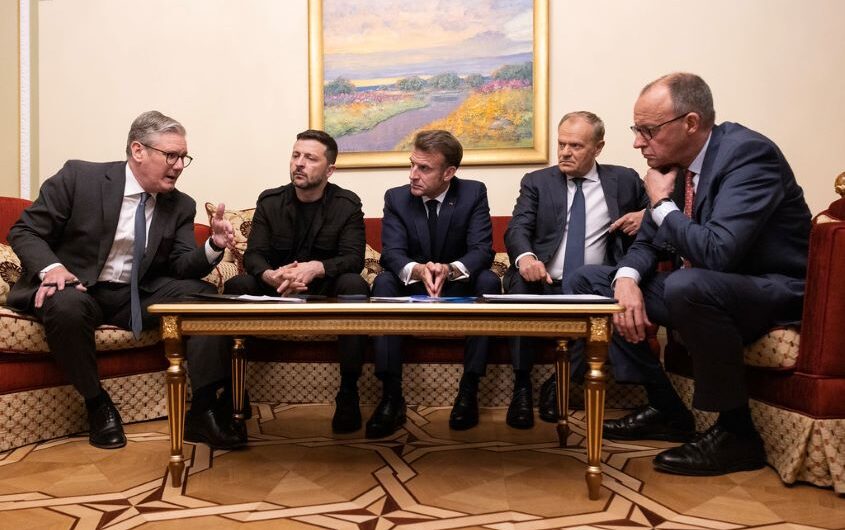
Simon Dawson / No 10 Downing Street via Flickr
German Chancellor Friedrich Merz’s Foreign Policy Approach

Phyllis Berry
Non-Resident Senior Fellow
Phyllis Berry is a Non-Resident Senior Fellow at the American-German Institute. She was the National Intelligence Officer for Europe from June 2021 until March 2025. She also served at the National Intelligence Council as Acting NIO for Europe from July 2017 through April 2018, Deputy NIO from April 2018 through July 2020, and senior advisor on governance for the NIC’s Strategic Futures Group during 2015-16. She authored the European futures papers for the 2017 and 2021 NIC Global Trends reports. From late 2014 to mid-2015 she was Director for Ukraine at the National Security Council. Dr. Berry has a Ph.D. in comparative politics from Georgetown University and has taught European comparative politics, French politics, German politics, and comparative leadership.
This is the first of a three-part series addressing German Chancellor Friedrich Merz’s approach to foreign and security policy, initial achievements, the key issues Merz faces through the end of the year, and his efforts to reform the foreign and security policy process in Germany.
German Chancellor Friedrich Merz entered office in May 2025 promising a more strategic and unified foreign and security policy to keep Germany safe, influential, and prosperous. Since then, he has used an intensive schedule of European and international meetings and engagements to establish himself on the European stage and develop a positive working relationship with U.S. President Donald Trump. His strong messaging of support for Ukraine and the need for Europe to meet its security challenges have gained domestic and international recognition. Merz now must build upon this early, mostly symbolic success to add more substance to his approach and show that the government is truly adapting to a more dangerous international environment.
A Sense of Crisis
Merz emphasizes that Germany faces the greatest foreign and security threat since the height of the Cold War. As he has repeatedly stated, Russia’s grinding war against Ukraine endangers not only that country but the entire European security order. On election night in February 2025, he was particularly concerned that U.S. President Trump was ready to withdraw from NATO, according to a well-placed German journalist. A life-long transatlanticist, Merz also questioned whether Vice President Vance’s attack on European governments at the Munich Security Conference was an attempt by Washington to undermine the European political and security order. In addition, Merz believed that Olaf Scholz’s outgoing government had failed to fulfill Germany’s leadership responsibilities, and constant coalition bickering and Scholz’s overly cautious approach had weakened Europe and left Germany isolated. In Merz’s view, Germany needs to play a more active role in supporting Ukraine, rebuilding its own military capabilities to defend against an aggressive Russia, and repairing its relations with its European and U.S. partners.
To do so, Merz took unprecedented action even before entering government. Without fully consulting his party, he reversed its long-standing adherence to the constitutionally enshrined debt brake and agreed to exempt security and defense spending from the balanced budget provision and establish a 500-billion-euro, ten-year special fund for infrastructure investment. This reversal of policy led to considerable unhappiness within his own Christian Democratic Union (CDU) and its Bavarian sister party, the Christian Social Union (CSU), but it has been central to increasing Germany’s credibility and room to act. The reform has also freed Germany to help make up for a lack of new U.S. military support for Ukraine while also enabling Berlin to be a relatively early advocate of the U.S. initiative to have NATO members spend 3.5 percent of their GDP on defense and an additional 1.5 percent on infrastructure. By late spring, the finance minister presented a concrete financial plan to reach that goal by 2029, and the medium-term budget plan also earmarks over eight billion euros a year for bilateral military assistance to Ukraine. Germany’s steps toward greater spending removed a longstanding bilateral irritant with Washington—and particularly Trump—and helped create a bandwagon effect as members approached the NATO Summit in July.
Merz also gained concessions in coalition negotiations to strengthen his direction of foreign and security policy. He accepted Social Democratic Party (SPD) control over the Finance and Labor Ministries in order to get the Foreign Office, and for the first time since 1966, the chancellor has a foreign minister of his choosing. Merz then leveraged a busy calendar of European and international summits and bilateral and mini-lateral meetings to forge ties with his European counterparts. This kind of personal diplomacy is particularly suited to Merz, whose self-confidence, direct approach, and experience in the private sector have made him a strong and effective interlocutor. His joint travel to Kyiv on May 10 with UK Prime Minister Starmer, French President Macron, and Polish Prime Minister Tusk signaled his intention to forge a joint European position. A successful Oval Office meeting on June 6 set the stage for a good working relationship with Trump, who called Merz to propose the initiative that now provides Ukraine with new U.S. military hardware financed by European governments. After the president announced his plan to meet with Putin in Alaska on August 15, Merz played a central role in transatlantic virtual and in-person meetings before and after the Alaska summit, particularly to ensure that the Ukrainian and European positions were fully synced vis-a-vis Trump. In these talks, Merz has politely but clearly reminded the president of the necessity for a ceasefire before the start of any serious negotiations.
Germany’s threat perceptions and willingness to devote significant resources to security and defense have increased significantly since Russia’s further invasion of Ukraine, and Merz entered office determined to create a government that would better deal with these challenges. He has shown considerable skill at building external relations, but in the next months, he will face key decisions on Germany’s role in Ukraine and its relationship to its European and U.S. partners.
All statements of fact, opinion, or analysis expressed are those of the author and do not reflect the official positions or views of the U.S. government. Nothing in the contents should be construed as asserting or implying U.S. government authentication of information or endorsement of the author’s views.








